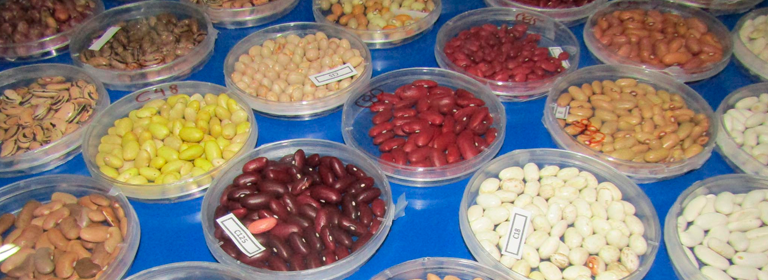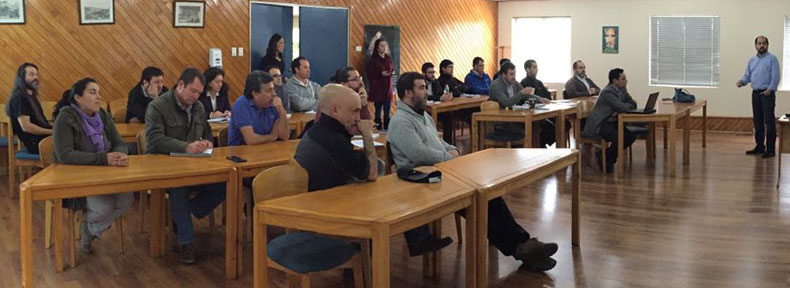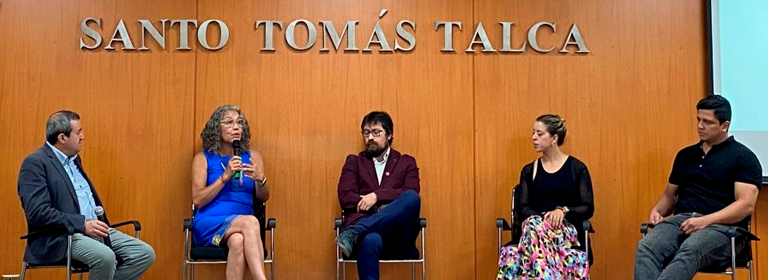Although it exhibits hundreds of varieties, beans have only six parent breeds. One of them, the «Chilean», is the subject of a UCM research that examines its diversity and seeks to revitalize its consumption.
 They can be “Granados”, “con riendas”, “pilco” or “mazamorra” ” A protagonist of Chilean lunch for generations, the bean has lost prominence despite its high protein, fiber, and vitamin content. Its low commercial profitability, prejudices regarding its consumption, and changes in eating habits have displaced this typical dish from the kitchen.
They can be “Granados”, “con riendas”, “pilco” or “mazamorra” ” A protagonist of Chilean lunch for generations, the bean has lost prominence despite its high protein, fiber, and vitamin content. Its low commercial profitability, prejudices regarding its consumption, and changes in eating habits have displaced this typical dish from the kitchen.
“We are eating more of the black and tórtola beans and if we have some 200 varieties, some with more than 35% protein, then we may lose diversity, heritage, and a good nutritional source,” said Botany Ph.D. Aparna Banerjee, alternate director of a UCM project examining the genetics and diversity of the legume, under the leadership of the Center for Studies in Processed Foods (in Spanish Centro de Estudios en Alimentos Procesados or CEAP). The initiative is financed by ANID’s Fund for Strengthening the Scientific Development of Regional Centers (in Spanish Fondo de Fortalecimiento al Desarrollo Científico de Centros Regionales).
“We are trying to understand how to improve bean cultivation with bacteria and different abiotic factors, such as temperature, drought and salinity, and to validate the laboratory work in the field. We planted in Licantén and our beans will come out in April,” said the also microbiologist from the Center for Research and Advanced Studies (in Spanish Centro de Investigación y Estudios Avanzados or CIEAM), which belongs to the Universidad Católica del Maule (UCM).
“We planted many varieties, including sapito and mantequilla. We will have a lot of work,» she said.
 «Chilean Breed»
«Chilean Breed»
The project, which has been underway for two years, has managed to collect samples of about 200 types of the legume between the O’Higgins and Ñuble Regions, within the same species.
“The objective is to study the ‘Chile’ breed. The center of origin of the bean is Guatemala and Mexico; from there during thousands of years, it expanded towards the south. In this process, the Chilean breed was formed,” said project director and CEAP’s scientific director, Basilio Carrasco.
The Chilean breed is part of the “Andean” bean matrix, which includes the Nueva Granada and Perú types. The Andean species, together with three Mesoamerican families, make up the parent breeds of the legume.
“The Chilean breed, together with those of South America, has a particularity that is the size of the seed, which is much larger than those of Central America and North America. There isn’t that much difference in taste”, pointed out the Ph.D. of Science during a talk he gave with his team at Colegio Esmeralda in Talca, with the support of a UCM extension program.
He added that, «With the nutritional analyzes that we are seeing, we detected several types with a good nutritional contribution, such as the ‘Palo’ variety, as people here call it, which has 30% protein, low levels of carbohydrates, and interesting antioxidant compounds. Fortunately, there is no variety in danger of extinction, because we have our own collection, independent of INIA’s germplasm bank”.
 Let’s eat beans!
Let’s eat beans!
Although scientific diligence has ensured the survival of the ancient food, global warming still constitutes a risk.
Cynthia Meza, who participated in the talk at Colegio Esmeralda as a former student, and research collaborator, said, “Beans can even help with chronic diseases. Protecting this biodiversity is important for health”.
Meza, a Ph.D. student in Translational Biotechnology at Universidad Católica del Maule, recently published an article in an international journal -as lead author- on the role of bacteria in the germination and growth of bean plants without using chemical fertilizers.
She advised, «To take care of biodiversity it is necessary to consume this food, to prefer it over introduced varieties, and to grow the seeds oneself. Large farmers could also consider the importance of this biodiversity and produce it”.












